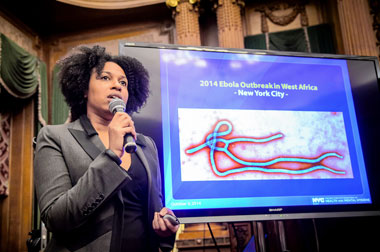New York has its first confirmed case of Ebola and there is a lot of fear and misinformation swirling around out there. Here, according to the health officials who convened at Borough Hall on Wednesday, is what you need to know to stay safe.
How it spreads
Direct contact with the bodily fluids of an infected individual
How it doesn’t spread
Through air, water, or food
Symptoms include
Fever of more than 101.5 degrees, diarrhea, muscle pain, severe headache, stomach pain, unexplained bleeding or bruising, vomiting, and weakness.
When symptoms begin
2–21 days after exposure
Contagiousness starts
When symptoms appear. Ebola gets more contagious as symptoms worsen
What you can do
Get a flu shot. Health officials want to keep people exhibiting flu-like — as in, Ebola-like — symptoms from clogging up emergency rooms and making it harder to single out actual Ebola patients
If you have traveled to Sierra Leone, Liberia, or Guinea in the last 21 days and have a fever
Call 911 or go to an emergency room.























